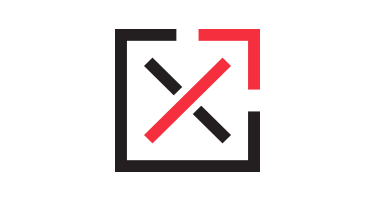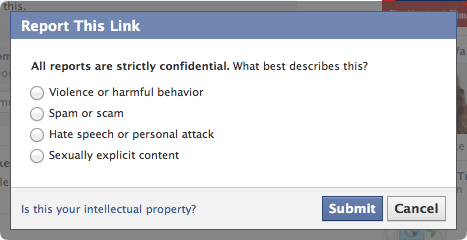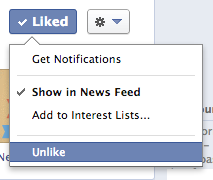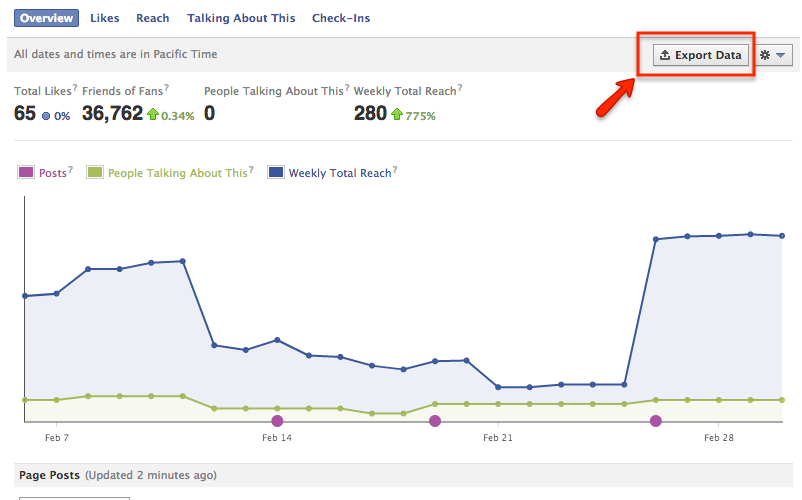 If you have never heard of negative feedback from Facebook before, you are not alone. We are all familiar with the positive feedback on Facebook, especially the like, but hidden within your insights, you will also find negative feedback.
If you have never heard of negative feedback from Facebook before, you are not alone. We are all familiar with the positive feedback on Facebook, especially the like, but hidden within your insights, you will also find negative feedback.
What is negative Feedback?
Negative feedback on Facebook occurs when a fan takes any of four actions:
1. Clicks hide post
When a user likes a page, posts from that page appear in the user’s newsfeed. If a user wants to see posts from the page in their newsfeed, but does not want a particular post to appear, they can choose to “hide” the post. To do so, users click on the small somewhat hidden arrow in the top right corner of the post. From there, they select “hide” in the drop-down menu.
This action removes the post from the newsfeed, but does not hide all posts from that page.
2. Clicks hide all
If a user no longer wants to see any activity in their newsfeed from a page they have liked, they have the option to “hide all” activity from the page. After the user clicks “hide” as described above, the post is removed, and the user sees a message similar to this:
If they select the first option “Hide all stories,” they will no longer see posts from that page in their newsfeed. A user could do this for several reasons. Facebook is a “social” network, so people use it to interact with their friends. They may feel like your page is to promotional and not social enough. They may also feel like they aren’t the intended audience for the page’s content. Or, they may feel like the page posts too frequently.
3. Reports post as spam
If a user thinks that a post from a page is abusive or inappropriate for Facebook, they may choose to “report the story or spam.” To do so, users once again click on the arrow in the top right corner of the post. However, instead of clicking “hide,” they click “report story or spam.”
This not only hides the post from their newsfeed, but also sends a signal to Facebook. The user has the option to explain why they find the post abusive (violence or harmful behavior, spam or scam, hate speech or personal attack, sexually explicit content).
4. Unlikes page
Finally, negative feedback can come in the form of unlikes from the page. This occurs when a fan decides they no longer want to be a fan of the page. To do so, a fan can either again hide a post and then select “unlike,” or from the Facebook page, a fan can click the “like” button and select “unlike.”
Why does Facebook negative feedback mater?
Negative feedback can hurt your page performance in several ways. First, it is obvious that you don’t want your fans reporting you to Facebook or unliking your page, but if a fan hides all posts from your page, they will never see content from your page in their newsfeed again. If this occurs, you have essentially lost them as a fan.
And while a fan hiding a single post from your page might not seem like a big deal, it still hurts your page. Facebook considers negative feedback in their Edge Rank algorithm, meaning that negative feedback makes your page’s content less likely to be seen by all of your fans.
So how to do you track negative feedback on Facebook.
To track negative feedback on your Facebook page, go into your Facebook page insights. To access your insights, you must be a page admin. In the center section of the admin panel, click “see all” next to insights. This will open your page insights. From there, select “export data” in the upper-righthand corner and select the date range you’d like to see.
Once you have downloaded the data, open it in excel. Select the “Daily Negative Feedback” tab at the bottom of the page. It is one of the last pages, so you may have to scroll a bit.
This will break down all of the negative feedback you have received on each of those days by the types described above. Keep track of what activities contributes to the most negative feedback, as well as what type of negative feedback you receive. Try changing how frequently you post, what types of posts you make, and what time of day you post to see if you can decrease your negative feedback.








